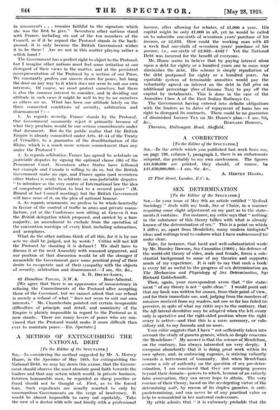A METHOD OF EXTINGUISHING THE NATIONAL DEBT
[To the Editor of the SPECTATOR.] Stn,—In considering the method suggested by Mr A. Hervey Hoare, in the Spectator of May 16th, for extinguishing the National Debt, we may lay down this axiom, that the Govern- ment should observe the most absolute good faith towards the lenders and that any action which would, in private business, between honourable men, be regarded as sharp practice or fraud should not be thought of. First, as to the forced loan. Such expedients are usually resorted to only by unscrupulous Governments on the verge of insolvency. It would be almost impossible to carry out equitably. Take the case of a doctor with wife and family with a professional
income, after allowing for rebates, of £1,000 a year. His capital might be only £1,000 in all, yet he would be called' on to subscribe one-sixth of seventeen years' purchase of his income, or £2,833. How could the working man with £3 a week find one-sixth of seventeen years' purchase of his income, i.e., one-sixth of 12,652-1442 ? Yet the National Debt was incurred for the benefit of everyone.
Mr. Hoare seems to believe that by paying interest alone. upon a debt for eighty or a hundred years one in some way diminishes the debt. His scheme is simply repudiation of the debt postponed for eighty or a hundred years. An equitable system of terminable annuities would pay the voluntarily agreed on interest on the debt in full plus an additional percentage (free of Income Tax) to pay off the capital by instalments. This is done in the case of the Annuities Class A of the East Indian Railways Co.
The Government having entered into definite obligations. with the lenders as to dates of repayment of loans has no right to disregard its contracts. There could be no guarantee' of diminished Income Tax on Mr. Hoare's plan.—I am, Sir,










































 Previous page
Previous page